Here’s an excellent follow-up on Wednesday’s post, and thanks to my blog reader Scott for providing these photos.
Call me biased if you want, but here’s a classic example of getting what you pay for…

Well, I survived Wednesday’s blog post without taking too hard a beating.
I was asked by many of my colleagues, “Why would you write something like this?”
I simply replied, “Why not?”
I’ve been told that the conversation that resulted about the value of Realtors, the value of MLS, and everything in between, could have “damaged” public perception, but I disagree. Personally, I think that the damage has already been done, and it’s a post like the on on Wednesday that can help to undo some of the damage.
Have you ever heard the expression, “It’s going to get worse, before it gets better.”
Or how about “To solve a problem, you have to admit you have one.”
Well, I was pretty forthcoming with my opinions on commission, discount brokerages, MLS, and the state of the entire real estate industry, and judging from the comments, readers agree that there are issues.
But show me one industry on planet earth that doesn’t have issues?
On the front cover of Wednesday’s Globe & Mail, we saw an article about Ontario Teachers, and how they’re going to allow HALF as many teachers into teacher’s college, and they’re going to DOUBLE the amount of time it takes to pass through. Ask a teacher, and they’ll tell you, “Great, so now OISE gets $10,000 instead of $5,000 in tuition. What problem does this solve?”
On the front cover of Thursday’s Globe & Mail, we saw an article about Major League Baseball, and how the league is going to suspend 20-30 players for using performance enhancing drugs, after the shamed owner of Biogenesis agreed to “name names” and cooperate with the investigation.
Every industry has issues, and every industry could be run better. This will never change.
Having said that, one of my readers sent me this amazing email this morning, complete with photos, and dates, as he has been tracking the “Sale Process” for a house down the street from him.
I think it illustrates my point about “getting what you pay for” with some (not all) brokerages, specifically those without traditional business models.
Thanks to “Scott” for providing all this info. He said he was taking photos over the last few weeks, and thought it would make a great blog post, if he had a blog, and then finally figured that if he sent it to me, I’d post it. Well, without further adieu…
A property was listed in the east end of Toronto, about four weeks ago, and on the very first day of the listing, the sign began to fall over.
It’s long been said that the “FOR SALE” sign is the strongest marketing tool, but all that changed with the advent of MLS. Nevertheless, the sign is still incredibly important, however I believe that a sign that shows like the one below will most definitely hurt the perception of value for the property:
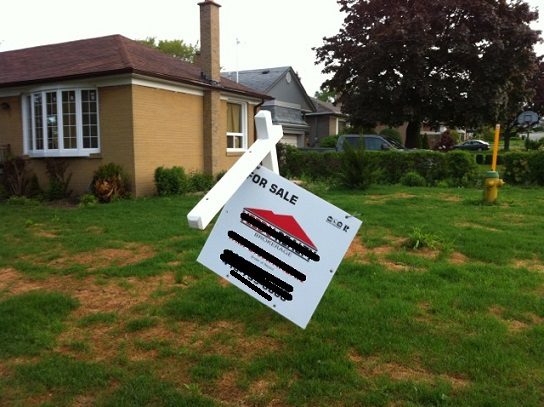
That wooden stake was crooked and tilted for a week, and the sign was hanging there, every day.
I know that this doesn’t have a material affect on the value of the home, but I think it hurts the listing agent’s negotiating position (clearly he’s a discount agent, who doesn’t visit the properties he has listed for sale, and doesn’t seem to put much effort in), and the sign (not to mention the brokerage) doesn’t convey anything stately, classy, or upscale about the house.
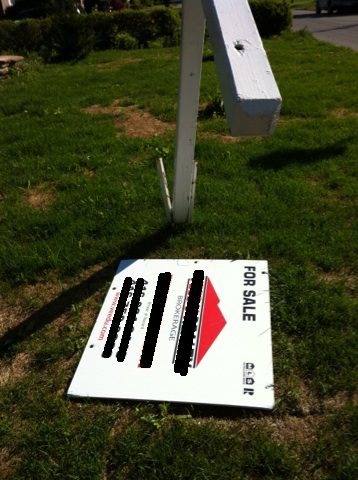
The sign remained on the ground for a few days, before finally, it blew away.
See the photo below:
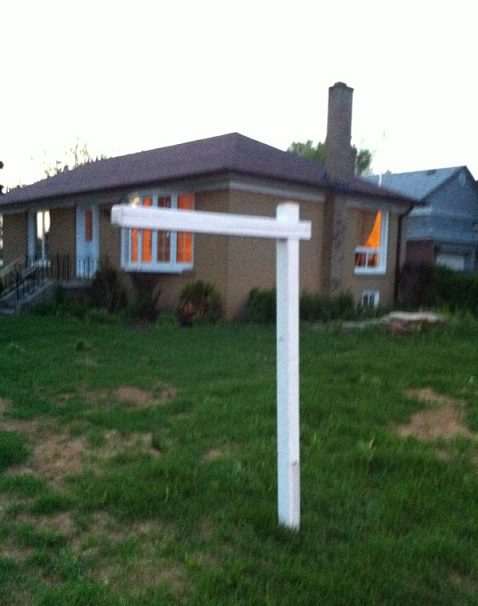
That’s right, folks!
The sign itself blew away, even though the wooden post remained!
That wooden post stayed there for six days!
Ladies and gentlemen, does this not demonstrate that sometimes, you get what you pay for?
Hire a discount brokerage, whose agent might work a full-time job at a call centre or doing data entry, while “working” in real estate on weekends, and this is what you get.
You get a listing with no sign, and a wooden post on your lawn.
I am 100% convinced that this affects the value of the home. Buyers and their agents must be laughing as they pass through. It’s unprofessional, and downright comical. And the buyers and their agents must figure, “This listing agent has no clue what he’s doing. He must be a moron.” And their offers will reflect that thought process.
Low and behold, the property sold. And this sign magically appeared:
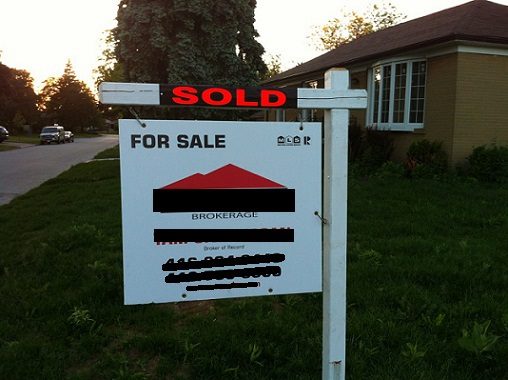
Sure.
Once the agent had a sale, he put the sign back up.
He wanted to show everybody it sold, and he wanted to have his name next to the word “SOLD.”
Congrats on a job well done.
And then what happened?
Have a look:
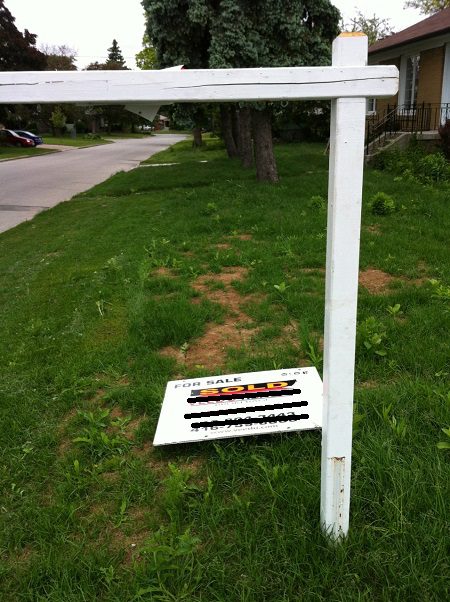
That’s what I’ve come to expect from a good portion of the industry.
Folks, there are better and worse agents out there, just like there are better and worse doctors, lawyers, accountants, mechanics, and dog-walkers.
I really do believe that in real estate, like any other industry, you get what you pay for.
.
Have a great weekend everybody!
Thanks for all the input on this week’s blogs, and thanks again to Scott for providing these photos and this story.
I may write the blogs, but it’s the readers that make it interesting with comments and opinion, good or bad.
See you Monday!































lui
at 8:27 am
If I want to get my Porsche 911 repaired I go to a mechanic that I know has experience and skills to fix right the first time with no BS,Im not going to bring it to Canadian Tires and have a apprentice straight out of high school touching it and having the service manager trying to repair items that is not needed.Selling a house is usually the most expensive a owner would ever come across in his/her lifetime why skip on a cheap broker that does nothing to get the most value out of the home instead of a more skilled broker that would market the home to the best price.
Joe Q.
at 10:07 am
If it’s not clear to the homeowner that the “more skilled” broker will get a better price or make the process easier for him vs. what he could do by himself or with a discount agent, I can understand why he would avoid paying more.
The issue with real estate — and where your analogy doesn’t work, IMO — is that the amount of experience needed to conduct a basic transaction is minimal. This is why the future of the RE business will focus on what value Realtors can add to the process, rather than the “gate-keeping” roles they played formerly. Realtors have to prove that they add real value (in a hot market, especially) if they want to convince consumers to use their services.
Long Time Realtor
at 11:34 am
@ Joe Q. Perhaps you could define for us exactly what a “basic transaction” is, because with over 25 years in the busines,and having purchased and sold numerous properties of my own, I have no idea what you mean.
I have also been hearing the same old song regarding the “value” of Realtors for over 25 years and how every year without fail, come the ominous declarations of their imminent demise.
Over the decades, I’ve witnessed dozens of discount brokerages and help-you-sell real estate companies come and go. Without fail, every one of them was going to “revolutionize” the real estate business.
As for the notion of Realtor as gatekeeper, there have never been more technology and tools available for the FSBO to take advantage of to sell their own home, yet the percentage of successful FSBO’s (5%) is exactly the same as always. Ever wonder why?
Joe Q.
at 3:38 pm
I am an outside observer so I don’t have the benefit of your extensive experience in the industry, but perhaps my perspective can be useful anyway.
To my eyes, the most basic elements of a RE transaction from the seller’s perspective are setting the price, listing the home for sale, reviewing and deciding on offers, and completing the necessary documents after one has been accepted. (If I have left out an essential element, please let me know.)
My impression is that the amount of experience needed to conduct a basic transaction such as this is minimal. I base this on the fact that newly minted Realtors, once their coursework is complete and their exams passed, are permitted to do these transactions (right?), and that this coursework can be completed in a few months.
Obviously there is a lot of value that an experienced Realtor can add to the process — pricing strategies, staging, timing, handling multiple offers. But I still contend that many of the essential elements of the process can be handled by an educated home-seller with the help of a lawyer, if he has access to the same information sources and databases as the Realtor does. The home-seller might not get as high a price, and he may find the process very time-consuming, but he can get it done.
If the home-seller feels that the Realtors he has worked with in the past have not added any value beyond these basics, he might decide to go it alone or work with a discount broker.
As for FSBO tools and why so few FSBOs are successful — all I can go on is what I’ve seen with my own eyes, and what I have read here and elsewhere. (a) FSBOs may be overpriced, either due to greed or lack of market information on the part of the seller. (b) FSBOs may not be listed on MLS. (c) Buyers’ agents may not be willing to show FSBOs to their clients.
What do you think?
Long Time Realtor
at 6:21 pm
In my opinion, the difficulty with your thesis rests on the fact that the “essential elements” of a “basic transaction” are non existant. Every deal has a life of it’s own. One never knows beforehand which deals are going to be troublesome.
To answer your query, the most important essential element in almost every transaction that you missed is negotiation skills. I’ve seen deals fall apart over appliances! Sadly, some agents major in minors and are incapable of keeping a deal and their clients on track with regards to the big picture. Most people despise the negotiation process, mainly due to lack of experience and inclination, yet no real estate deal gets done without it. It’s not for lack of information that most homeowners don’t try to sell their own home.
Jesse
at 7:19 pm
If I might add, that many sellers also major in minors (that’s a perfect analogy). Something I believe cripples FSBOs.
jeff316
at 1:09 pm
I’d agree and would add d) dealing with an FSBO has a much higher pain-in-the-ass risk than dealing with an agent.
I’d also agree with Long Time Realtor that the element that most often gets missed in all of these discussions is negotiation and strategy. Not that there aren’t people who are capable of doing this themselves, but good agents probably have more experience in this than your average buyer/seller.
JC
at 10:40 pm
Jesse, I like that you mentioned that sellers also “major in minors”.
I find that a good number of people out there wanting to sell are what I call “HGTV experts”. Those that have watched an hour or two of HGTV and suddenly think they know it all. As Long Time Realtor said, it’s incredible how many deals go south, or almost go south over a set of 10 year old appliances. It’s sometimes difficult to get sellers to focus on the big picture. They’ll refuse a sale over 1,000 and feel like they’ve stuck it to the buyer, but not take into account extra mortgage payments etc for that extra time it takes to get another possible offer, if it comes at all. I’ve had clients argue with me that their place didn’t smell of cigarette smoke (it certainly did), refuse showings and say “if they really want to see it, they can come tomorrow” (on a day where 3 different parties wanted to see it), and seem to think that Staging is covering up flaws rather than fixing them.
All this being said, I find that often, the most aggravating part of working in Real Estate is dealing with other Agents. The level of unprofessionalism out there is staggering. It’s no wonder that Realtors have a reputation worse than used car salespeople – with no offense meant to used car salespeople.
johnny chase
at 8:55 am
@LTR:
Definition of a Basic Transaction:
if you’re an agent in Toronto for the past 10 years – its generally been this:
1. Hold agent open house;
2. Hold public open house on Sat / Sun but get junior in the office to do it
3. Hold the auction on Tues or Thurs.
4. Send 3 of the 7 offers back and tell them to re-bid
5. Sell the house for 5% above market
6. Wait 60 days
7. Collect your $25K.
Al
at 10:28 am
Ur a fool
Mike
at 8:54 am
Great blog post to the other day David, but I’ll have to disagree with your line of thinking on this one. I wouldn’t blame the realtor for the sign, and rather I would put the entire blame on the home owner. If I was selling my house and I saw that sign falling down, I would personally stabilize it and put it back into place. The fact that the home owner saw the sign in that condition for 6 days and didn’t fix it themselves speaks volumes.
Truth be told unless your personally showing one of your listings, don’t tell me you actually drive by the property on a regular basis to check on the sign. It’s a complain driven process, and the home owner definitely dropped the ball on this one.
Bojangles
at 9:56 am
Nah Mike. The agent here is full retard. What if the homeowner is out of town? 6 days?! Come on man!
There’s gotta be an intern on junior broker that can spend a few hours a week driving by brokerage listings and checking the signage, as well as the house. IE maybe suggesting to an owner who is not out of town 😉 that he/she cut the grass when the house is showing.
When you;re paying a broker tens of thousands of dollars to sell your house, goddamn right they should make sure their sign is upright. As David mentioned, it looks bad on the brokerage as well as the agent. AFter spending hundreds of k on branding and ads over a number of years, a brokerage NEEDS to protect that investment. Full retard.
Mike
at 11:26 am
I’ll agree if the home owner is away then its the agents responsibility. But truthfully, who goes away when their house is up for sale? What if an offer comes in? I’m not saying it doesn’t happen, I just think its far more plausible that the home owner left the sign that way.
Jesse
at 7:10 pm
Who all can see the brokers remarks?… Apparently lots of sellers suddenly ‘go out of town’ the day the house is listed (24-48 hour irrevocables).
I think this is a good illustration albeit Wednesdays article drove it home with far more substantial reasons to proceed with caution around discount brokerages. As always, entertaining .
gerrit4
at 11:50 am
If a client gets what you pay for, does that mean that you do more work for someone selling a million dollar home, than a client with a $300,000 home?
Would you turn down a lower commission on a higher valued home? For instance if home #1 is a $300,000 condo with a 2.5% commission, and home #2 is a million dollar house with a 2% commission, you would say no to the $20,000 commission but yes to the $7500 commission? Isn’t it the same amount of work regardless of the value of the home? Assuming the buying agent commission is 2.5% in both cases.
Why is there an assumption that agents who take cheaper properties at full commission will work harder than agents with more expensive properties at a lower commission. It’s the same amount of work right?
Why would a percentage matter so much to a selling agent? Heck 1% of a million is still higher than 3% of 300,000.
Actually, on that note, why do we pay agents a percentage anyways when it’s the same amount of work. Why isn’t it a standard $10,000 fee for the buyer and seller?
George
at 4:48 am
Further to this point, does an agent in Toronto work that much harder than an agent in Atlanta, where houses can be found in the 5-digits? I think there is a lot of merit to a mixed flat fee + commission pricing model.
jeff316
at 1:10 pm
In a hot market, they probably do work harder than an agent in a cooler market.
Suburban
at 4:39 pm
I understand why David is skeptical of discount brokerages, but I think the bigger problem (which he also mentioned) is part-time realtors.
From my personal experience, I was recommended a part-time realtor by a trusted family friend and the experience was a complete flop – mistakes in the listing we had to pester him to fix over and over, not answering phone calls from interested buyers’ agents, etc.
At my old office, I worked with no less than four people who did real estate “on the side”.
All of them worked for big brokerages, not the discount ones.
Suburban
at 4:42 pm
Oh, and of course other professions have problems! But this isn’t a teachers blog, this is a real estate blog 🙂
I used to be a travel agent…. don’t get me started….
Chuck
at 1:15 am
As a side note, I heard from my sign installer that there’s a rival company that’s actually going around and loosening their S-clips from the tops of the signs so that this exact thing happens and makes the sign company either look bad, or ties them up with repairs, increasing their lead time.
Dirty rotten scoundrels.
Devore
at 6:11 pm
While I don’t doubt many discount brokerages and agents working for them do a poor job, there are two assumptions in your post today. One, that a discount broker will do a terrible job, and two, that a non-discount broker will do a good job. These are both false. Plenty of full-commission agents have crappy listings, no effort or advice to the owner, and generally do poor marketing. On the other hand, lots of young discount brokers bust their butts.
You gotta start somewhere, and as a freshly minted professional often you have to take less money or less desirable jobs (which pay less) before you can establish yourself.
The only generalized comment you can fairly state here is to stay away from part timers. Your brother in law doing real estate on the side isn’t gonna cut it in anything other than a red hot market.
ScottyP
at 1:09 am
Fair enough, Devore. But I’m guessing that the brokerage that Dave kindly blacked out in the photos is a discount brokerage.
We’ve all started out in jobs that were perhaps beneath our abilities, passion, work ethic, and willingness to bust tail. So point taken about all those young turks in RE who are struggling to make a name for themselves at some kind of discount brokerage. The best of them should be recognized for their efforts in due course and, one would hope, awarded accordingly.
Meanwhile, the vast majority of discount brokerages are a joke. How do I know that? a) In life, you usually get what you pay for; and b) David tells us so. Sure, there are exceptions; I’m sure some Stalinists were really nice people.
When you’re dealing with one of the most financial important transactions of your life, here is the advice to take to heart: Don’t be lazy in your research, don’t think that all agents are the same (because they’re not), and don’t be a cheapskate. This applies to crappy discount brokerages, crappy part-timers, and crappy full-commission agents alike. I think that’s the gist of where David was getting at.
Maggie K.
at 12:03 am
Our sign blew off a couple of times. What a pain. Much ado about signage. And now without further ado here are some lyrics from the Sound of Music: ‘So long, farewell, Auf Wiedersehn, adieu. Adieu, adieu. To you and you and you.’.